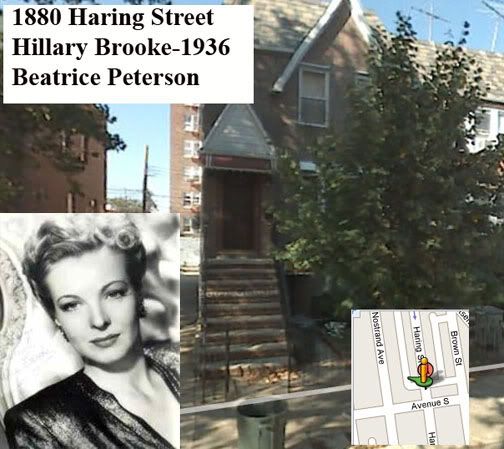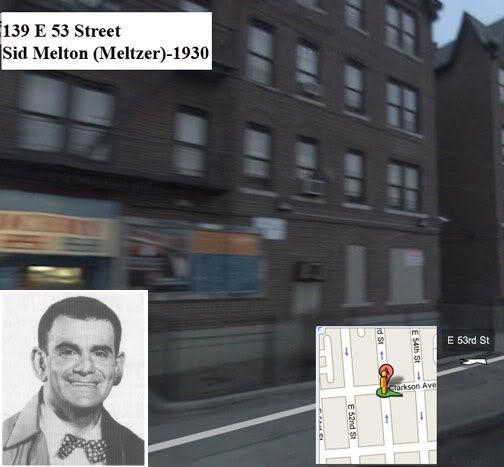

For baby boomers Sid and Hillary were all over the tv dial. Sid grew up in East Flatbush. Hillary was born in Astoria and later she moved to Sheepshead Bay.
About Sid, an excerpt from an interview with Tom Weaver
Brooklyn's own Sid Melton (real name: Sid Meltzer) inherited his comedic talent from his father, a well-known comic who appeared on stage with many of the greats of his era. (Melton: "When my father was playing in London, Charles Chaplin came backstage and wanted to meet him. To tell him how much he enjoyed his performance.") Sid made his stage debut in the road company of the Broadway play See My Lawyer in 1939 and then, with an assist from his screenwriter-brother, broke into motion pictures two years later. TV fans are apt to associate him with some of the popular series (Make Room for Daddy, Green Acres, etc.) he worked on as a regular, while B movie fans will remember him as the "house nebbish" for Lippert Pictures, the low-budget outfit that churned out scores of late 1940s-early '50s pictures -- and, it seemed, tried to "make room for Melton" in nearly all of them! Here, he talks about one of his favorite movie roles: the comic relief Air Force crew chief in director Sam Newfield's 1951 dinosaur "epic" Lost Continent.
SID MELTON: My brother, who's gone, was Lewis Meltzer, a wonderful screenplay writer who wrote I-don't-know-how-many movies. His first movie was Golden Boy [1939] -- he adapted the Clifford Odets play for the screen. He also wrote Rita Hayworth's first starring role, The Lady in Question [1940] with Brian Aherne. It was a great movie. And he put in it a part for a guy called Glenn Ford, and that started him on the road. My brother wrote for Cary Grant, Charles Laughton ... wonderful pictures.
My brother had friends in the industry, and one of them was an agent who got me an interview at MGM. And I got the part: In 1941, I did a little one-scene thing with William Powell and Myrna Loy, who were giant stars. Shadow of the Thin Man. It was just a couple of days, but I loved working in front of the camera with people like Powell. William Powell was a wonderful actor. I was 20 or 21.
I remember exactly how Robert Lippert and I met. I met him because of a friend who's gone, Harry Berman. Harry was an actor -- he was talented, and a wonderful guy. Six-five! And you're talkin' to a fella five-four, five-three-and-a-half or four. Harry was with us when we went over to entertain the troops, toward the end of World War II. After the war, he suggested that I call this Englishman we knew, an English writer, wonderful fella. Aubrey Wisberg [a Hollywood screenwriter]. Harry said to call Aubrey, 'cause we both had met him and knew him. When I called Aubrey, Aubrey said, "You'd be good for one of the little parts in Treasure of Monte Cristo" [a 1949 crime drama Wisberg co-wrote and co-produced]. We went to San Francisco and did it. It was a Lippert picture and Lippert, having seen me in that, I guess became slightly interested. Not excited.
Then I did a nightclub revue, wonderful revue, called Smart Set, at the most famous club in Hollywood ever, Ciro's on the Sunset Strip. I guess Lippert saw that too, and one of his associates, Murray Lerner, called me in to do a part in another Lippert picture. Lerner was a nice guy -- he knew pictures, the making of 'em, the marketing, the distribution, everything. This new picture they put me in was called Tough Assignment [1949] with Don Barry and Marjorie Steele. After Tough Assignment, I went back to New York on a bus -- the All American Bus, I'll never forget it. Forty dollars with meals, and the meals were always chili [laughs]. In New York, I did a couple of shows, including one I did on Broadway and I got wonderful notices, wonderful reviews. Called The Magic Touch. I was staying at the Capitol Hotel near Madison Square Garden, the original one, on Eighth Avenue and 50th or 51st Street, and one day I got a message that I was to call Murray Lerner in Hollywood. When I got him on the phone, he said, "You want to come back? Bob Lippert wants to sign you to a contract." I went back by train -- three days. The bus was five days.
When I got back to Hollywood, they talked to me about signing with Lippert. Which I did. Terrible, terrible pay, but that didn't matter, I was thrilled. I will always be thrilled, because I learned to use my talents before the camera. That was the thing I loved about it, the fact that I learned to work before the camera and got to know the "tricks." I always, always loved the movies, ever since I can remember.
My favorite director then, and will be one of my favorites forever, was Sam Newfield, who did Lost Continent and many other great pictures. His Lost Continent is an epic that was waaay ahead of its time. He could do anything, Sammy Newfield, he was one of the most wonderful directors. He used to let me re-write my own scenes in the various pictures, which I did.
TOM WEAVER: Do you remember re-writing any of your Lost Continent scenes?
SID: No, on Lost Continent I don't think I did. Maybe I put in a line or two ... I don't remember.
Sammy Newfield's brother was Sig Neufeld, a producer. (Sammy had changed his name to Newfield.) It was a strange thing: Sammy and his brother SIG Neufeld, they both had one short arm. I don't know what the reach is for most people, 31 inches maybe. Well, both Sammy and Sigmund, I would say there was almost a foot's difference between the two arms. About 10, 12 inches -- very noticeable. Each had an arm that was really crippled at birth, both sons. It was an amazing thing.
Newfield knew what he was doin'. I think that guy has gone down on record as being the fastest B picture director, and he was (I think) superb at what he did. Sammy Newfield was an ace behind the camera, knew what he wanted. He was one of the most wonderful directors and one of the most underrated. He was never given his "big break," the chance to do big A-budget pictures. We did Lost Continent in 11 days, Nowadays, for the same type of picture, if not the same picture, they would take five to six months. Eleven days, we did it in. Most of the features I did for Lippert were done in five days! Would you believe that? I thought so much of Newfield, he was that easygoing and that tremendously gifted. He was the sweetest guy in the world, and I was so sorry when he went [died]. He and Sidney Furie [Lady Sings the Blues, 1972] were my two favorite directors. Sammy was very inventive and very, very kind, he was the nicest director I ever worked with. I never worked with anyone as kind and as understanding and as inventive ... such a great director.
Q: What was your reaction to being offered a starring role in a sci-fi movie?
SID: It was a very good one, it was a happy one, a happy reaction. I hadn't read the script yet, but I liked the idea as soon as I was told, "You guys are assigned to go and look for a missing rocket." You know who is in your camp, who really thinks as [highly of Lost Continent as] you do? Frank Sinatra, Jr. Lost Continent is one of Frank Sinatra, Jr.'s, favorite movies of all time. He never stops talking about it. He got me for Christmas a case of about 10 or 15 VHSs he wanted me to watch, and one of them is Lost Continent.
We shot Lost Continent at Sam Goldwyn Studios. The thing that really stunned me was that set that they built for the climbing-the-mountain scenes, a wonderful, wonderful set. It was about 60 feet high, and they didn't have a net -- that really threw me! I'll never forget the fact that I was that frightened and worried. And a few others were, too. There were no nets under us, and you really had to dig into that material that the special effects men and set designers and carpenters built it out of. It was at least 60 feet high -- big! -- and there was nothing under us to catch us. But no one fell, thank God. No one except for the stunt double for Whit Bissell. The stuntman fell into a mattress or an air bag or something. It was a pretty good fall -- and he had to fall backwards. It was not less than 30 feet.
Everyone in the cast was wonderful. And I don't just say that. The cast was wonderful to work with -- Cesar Romero and Whit Bissell and Hugh Beaumont and Chick Chandler. Cesar Romero, I got along with fine. He was a good actor. Whit Bissell -- excellent, excellent actor. And John Hoyt -- oh my God, he was a wonderful actor. You know his real name? Hoysrack. German name. I remember my brother the writer taking me to see John Hoyt (when he was John Hoysrack) in a club. A little club, like cafe society. I was about 16 or 17. My brother said, "This man is very funny and very wonderful." I never drank then, I never drink now, I never will, but I sat and had my root beer, and Hoysrack did his wonderful stand-up act. Very, very intelligent, very intellectual, you know. He'd talk about this friend of his who was [imitating Hoyt] "veddy, veddy, veddy much into gardening. He'd have a lovely garden outside his window. A bed of roses ... a bed of marijuana ... a bed of roses ... " [Laughs] In Lost Continent, he was excellent, playing the guy everybody thinks is the heavy. Wonderful actor and nice man. He was really a gentleman.


























No comments:
Post a Comment